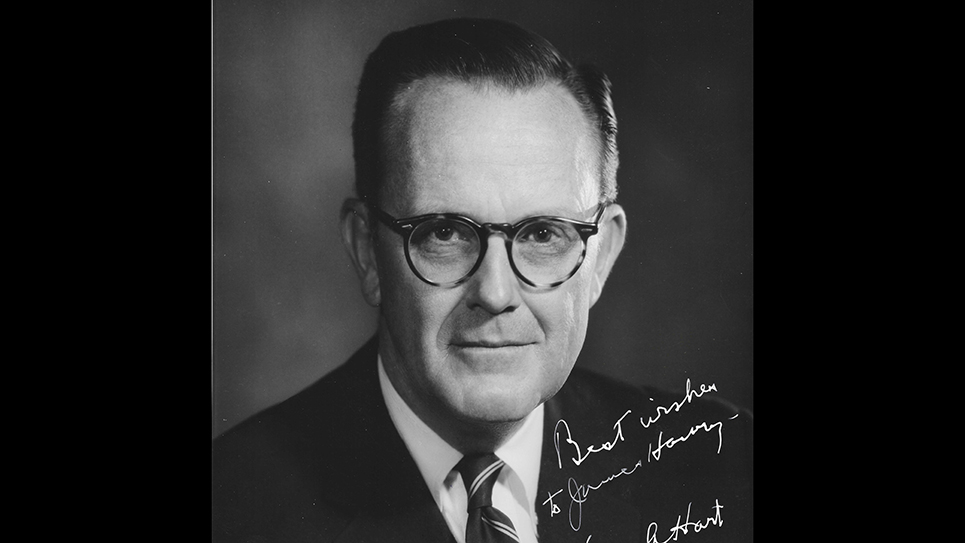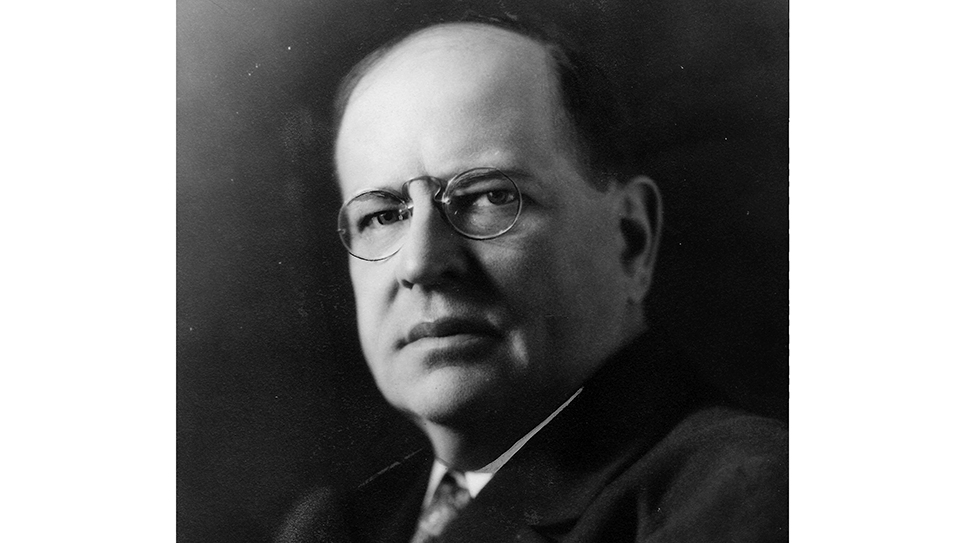The Senator From Michigan
Philip A. Hart
Senator Philip A. Hart was part of “the Greatest Generation,” those Americans born between 1900 and 1925, most of whom fought in the Second World War. Many of them were old enough to recall the First World War, and all of them lived through the Great Depression. My grandfather on my mother’s side exemplified that to me, having served in the Navy during World War II. John Swainson, a former governor of Michigan, summed up the life of the senator, saying, “That is the mystery of Phil Hart. His gentleness and his perseverance made him a great man.”
Hart was one of the thousands of Americans who stormed the beaches of Normandy on D-Day and was wounded by shrapnel on Utah Beach. Phil Hart was sent to Percy Jones Army hospital in Battle Creek, Michigan. There he met two other wounded veterans whom he would later serve with in the United States Senate: Bob Dole and Daniel Inouye. Rising to the rank of lieutenant colonel, Philip Hart was awarded the Purple Heart, the French Croix de Guerre and the Bronze Star medals.
Philip Hart served eighteen years in the United States Senate and was well-loved and admired by many of his colleagues, both Democrats and Republicans. Hart became known in the press as “The Conscience of the Senate.” A devout liberal, Hart was also a gentle man, possessing a gentle and warm sense of humor, completely free of any pretensions. When Hart announced his retirement from the Senate due to failing health, the senator added it was time for new ideas and new faces in Washington. There are three Senate Office Buildings housing the senators, their staff, committee and hearing rooms. The oldest Senate Office Building was named for Georgia Democrat Richard Russell and the “new” building completed in 1958 was later named for Republican Everett Dirksen of Illinois. To honor Philip Hart, his colleagues voted to name the third building, then under construction, after the Michigan senator. Mike Mansfield, who was also retiring from the Senate in 1976, once said of Hart in a meeting of the Democratic caucus, “In my opinion, Phil Hart is the best senator of us all.”
That occurred after Hart had defied convention and tradition when he cast the only vote in the caucus against elevating Senator James O. Eastland of Mississippi to the position of President Pro Tempore of the Senate, putting the Mississippian in line for the presidency. Hart strongly disapproved of Eastland’s views on civil rights and told his fellow Democrats the senator from Mississippi would make an “outrageous” chief executive. “For me to put him in line for the presidency is something I can’t do,” Hart told his colleagues.
It was Senator Philip A. Hart who sponsored legislation to scatter the largest and most influential corporations in the country, including General Motors. For a Michigan senator to defy General Motors was almost unthinkable, as it was a behemoth in the economic life of the Wolverine State.
Senator Hart hoped to win hearts and minds with gentle persuasion rather than arm-twisting in a city where arms were routinely pulled out of their sockets.
Hart married wisely and well, tying the knot with Jane Briggs, daughter of multi-millionaire businessman and philanthropist Walter Briggs, who owned the Detroit Tigers at the time. “Janey” Briggs Hart was an individualist in her own right, as well as quite an accomplished woman, becoming the first woman to pilot a helicopter in Michigan, and she flew her own airplane. It was Janey Hart who flew her husband to campaign stops all over Michigan when he ran for the United States Senate in 1958.
Phil Hart had met Jane Briggs through her brother, who was his college roommate. The Harts were a prolific couple, and their union produced nine children, although Philip Jr. tragically died while a toddler. Jane Briggs Hart was a plain-spoken and highly opinionated woman who was a proud member of the National Organization of Women (NOW) and did not in any way resemble the traditional political helpmate of most officeholders. When Jane announced she would not pay income taxes, explaining, “I cannot contribute one more dollar toward the purchase of more bombs and bullets.” Senator Hart told newsmen he was supportive of his wife’s anti-war position, although he couldn’t agree with her subverting the “rational structure of government.” Jane Hart was also arrested at a Catholic mass held inside the Pentagon, protesting the Vietnam War. While perhaps not as virulent as his spouse, Senator Hart was a strong opponent of the war in Vietnam. During his last six years in office, Philip Hart wore a beard. The senator had promised two of his teenage sons that were he reelected to the Senate in 1970, he would grow a beard, which he kept until the end of his life.
After the war, Hart practiced law and lived the life of a family man and developed an interest in Democratic politics. Phil Hart was mentored in politics by his one-time law school classmate G. Mennen Williams, heir to the Mennen Company, which first produced talcum powder, then new to the market in 1878. Later, Mennen became known for products like “Speed Stick” and its skin bracer aftershave. Williams was the grandson of Gerhard Heinrich Mennen and was named for his grandfather. The company’s products also gave Williams the nickname of “Soapy,” and he was elected governor of Michigan in 1948. Once in office, Governor Williams tapped Hart to serve as the Corporation Securities Commissioner for Michigan. President Truman appointed Phil Hart to serve as the U.S. Attorney for the Eastern District of Michigan in 1952 and served for a year until Dwight Eisenhower was elected and he was replaced by a Republican appointee. Once again, Governor Williams appointed Hart as his legal counsel. In 1954, Williams backed Philip Hart for lieutenant governor, an elected post in the Wolverine State. As governor, “Soapy” Williams controlled the levers of power in Michigan and had extended a tight grip on the Wolverine State’s Democratic Party. Williams’ political alliance with Walter Reuther and the CIO was distasteful to many old-time Democrats. Hart’s opponent inside the Democratic primary was George S. Fitzgerald, who had been the attorney for Jimmy Hoffa’s AFL Union, which had no use for Governor Williams. Philip Hart won by better than two-to-one.
Both Williams and Hart were elected and reelected in the 1956 general elections.
When “Soapy” Williams showed no inclination to run for the U.S. Senate in 1958, having opted to seek yet another two-year term as governor, Phil Hart became a candidate for the Democratic nomination. Hart was the beneficiary of a united party and won the nomination with more than 80% of the ballots cast for the right to face the GOP incumbent, Senator Charles E. Potter.
Charlie Potter was a meek-looking fellow, only forty-two years old, but he was also part of that “Greatest Generation” and had lost both legs during the Second World War and walked with crutches for the remainder of his life. Potter had won a special election to fill a vacancy in the House of Representatives when the incumbent congressman suddenly died. Potter had moved up swiftly and had beaten Senator Blair Moody in the 1952 election. Republicans had done very well in Michigan for the better part of two decades and the pendulum was beginning to swing back in the other direction. Senator Homer Ferguson had lost his reelection bid in 1954 in an upset, and by 1958, Charlie Potter was the lone Republican holding statewide office. Potter’s reelection campaign suffered from defections on the far right by those who idolized the late Joe McCarthy and a perceived lack of support from President Eisenhower. 1958 was a catastrophic year for GOP incumbents, and Hart won a relatively close victory, beating Potter by 170,000 votes out of 2.25 million cast. Never again would Philip A. Hart ever dip below 60% of the vote when running statewide. In his 1970 reelection campaign, Senator Hart defeated Lenore Romney, former First Lady of Michigan, the wife of Governor George Romney and the mother of Mitt Romney.
A genuinely modest person, Hart drove his press secretary to distraction, who complained that it was nigh to impossible to craft a biography for the senator and relate his accomplishments in the Senate due to Hart’s dislike for what he regarded as “self-congratulatory political documents.” Hart himself penned a portion of a biography noting his reelection to the Senate in 1964 “was not unrelated to the national candidacies that year of Lyndon B. Johnson and Barry Goldwater.”
When “Soapy” Williams finally decided to make a bid for the U.S. Senate in 1966 following the retirement and death of Senator Pat McNamara, he lost to conservative GOP Congressman Robert Griffin. Senator Griffin would be almost inevitably on the other side of any question of his Michigan colleague. Phil Hart never bowed to political pressure and busing became a heated issue in the Wolverine State (George Wallace confounded just about everyone when he won the 1972 presidential primary in Michigan), Hart opposed curbs on school busing to achieve racial balance even when it became a flash point for tens of thousands of Michigan voters. While political opposites, Phil Hart and Bob Griffin personally remained good friends.
Senator Hart was a thorn in the side of the presidential administration of Richard Nixon and was a leader in the fights to deny confirmation of both Clement Haynsworth and Harold Carswell to the Supreme Court of the United States. Hart was supposedly offered a seat on the high court himself by President Johnson when Abe Fortas resigned due to the controversy surrounding his nomination to serve as chief justice. Senator Hart was said to have politely turned down the tentative offer, saying he didn’t wish to be the beneficiary of Fortas’ misfortune. Hart was a stalwart in the Senate in support of Lyndon Johnson’s Great Society and was the floor manager for the Voting Rights Act of 1965. Senator Hart was a champion of the consumer and sponsored the Truth in Lending legislation.
Philip Hart opted not to seek reelection in 1976, and only a month after his June 1975 announcement did he learn from doctors that he had cancer, which had already spread throughout his body. Senator Hart wasted no time on self-pity and worked hard at his job until he could no longer do it. Speaking to the members of Michigan’s congressional delegation in September 1976, Hart said simply, “I close as I began, by thanking all of you for trusting me.”
Hart died days before he would have retired from the United States Senate. The Detroit Free Press declared Hart had become a legend during his own lifetime. In the editorial published by the Free Press following the senator’s death, the newspaper stated, “There are few people who are almost universally respected. Respect, after all, must be earned. But Philip Hart was such a person.” The Free Press readily acknowledged, “And saying goodbye is not easy at all.”
Senator Philip A. Hart’s funeral was held in Washington, D.C., at St. Matthew’s Cathedral. A reporter observed the number of black suits and mink coats going inside, along with “faded blue jeans stuffed into heavy boots” at a time when casual dress was not an option for funerals. It was not Hart’s usual place to worship, but when the failing senator was told his own church could only hold 350 people and his staff suggested mourners would need tickets to get inside, he demurred.
The last thing Philip Hart was aware of was his daughter Ann and three friends singing carols in his bedroom on Christmas night.
Philip Hart died the day after Christmas 1976, with Jane, all eight of his children, his son-in-law and two grandchildren at his bedside when he passed. Only sixty-four years old when he died, Senator Philip A. Hart’s earthly remains were taken to lie near his namesake and toddler son in Michigan.
© 2025 Ray Hill







